Public Broadcasting Faces $1.1 Billion Funding Cut in Rescissions Act
The recent introduction of the Rescissions Act has sent shockwaves through the public broadcasting sector, with proposed funding cuts totaling $1.1 billion. This legislation, which seeks to reduce federal spending, could significantly impact the operations of public television and radio stations across the United States. Industry advocates are voicing concerns over the potential loss of programming and services that many communities rely on, particularly in rural areas. If passed, the act would not only affect established networks like PBS and NPR but also threaten local stations that provide essential news, educational content, and cultural programming. As lawmakers debate the implications of these cuts, public broadcasting supporters are mobilizing to protect this vital resource that serves millions of Americans.
Understanding the Implications of the Cuts
The proposed funding cut is part of a broader initiative aimed at reducing government spending. The Rescissions Act aims to rescind previously allocated funds, which includes significant allocations to the Corporation for Public Broadcasting (CPB). This could lead to a range of consequences for public broadcasting services, including:
- Reduced Programming: Local stations may have to cut popular shows or educational programming.
- Staff Layoffs: Many stations could face staff reductions that may hinder their ability to produce local content.
- Community Outreach: Programs designed to engage with and educate local communities may be scaled back or eliminated.
Impact on Local Stations
Public broadcasting plays a crucial role in communities nationwide, especially in underserved regions. Many local stations depend heavily on federal funding to support their operations. According to the CPB, nearly 70% of public broadcasting funding comes from federal sources, making these cuts particularly alarming. For instance, a small station in a rural area may rely on federal funds to provide educational programming that is otherwise unavailable. With the potential for significant funding cuts, many station managers are preparing for tough decisions.
Advocacy and Support for Public Broadcasting
In response to the proposed cuts, several advocacy groups have rallied to defend public broadcasting. Organizations such as PBS and NPR have launched campaigns to inform the public about the value of their services. These campaigns emphasize the importance of public broadcasting in delivering unbiased news coverage, educational resources, and cultural programs. Supporters argue that public broadcasting is essential for fostering an informed citizenry and providing a platform for diverse voices.
Legislative Landscape and Future Outlook
The Rescissions Act is currently under review in Congress, where lawmakers are weighing the potential effects of the cuts against the need for fiscal responsibility. Some legislators argue that public broadcasting should not rely on taxpayer funding when there are alternative sources of revenue available. Others counter that the benefits provided by public broadcasting far outweigh the costs, particularly in times of political polarization and misinformation.
As the debate unfolds, the future of public broadcasting hangs in the balance. Local stations are encouraged to engage their communities and lawmakers, emphasizing the importance of continued support for federal funding. The outcome of this legislation could reshape the landscape of public media in the United States for years to come.
What Can Supporters Do?
Public broadcasting advocates can take several actions to support their local stations and the broader network:
- Contact Legislators: Reach out to local representatives to express support for public broadcasting funding.
- Engage with the Community: Participate in local events to raise awareness about the value of public media.
- Donate: Financial contributions to local stations can help offset potential funding losses.
Conclusion
The proposed $1.1 billion cut to public broadcasting funding through the Rescissions Act poses significant challenges for local stations and the services they provide. As the legislative process continues, it is clear that public support and advocacy will play a crucial role in determining the future of public media in the United States.
Frequently Asked Questions
What is the total amount of funding being cut from public broadcasting?
The total funding cut for public broadcasting amounts to $1.1 billion as outlined in the recent Rescissions Act.
How will the funding cuts affect public broadcasting services?
The funding cuts are expected to significantly impact public broadcasting services, potentially leading to reduced programming, layoffs, and decreased operational capabilities.
What is the Rescissions Act?
The Rescissions Act is a legislative measure that aims to reduce federal spending by eliminating or cutting funds from various programs, including public broadcasting.
Who is responsible for the proposed funding cuts?
The proposed funding cuts are a result of legislative decisions made by the current administration and Congress, seeking to prioritize budget reductions across various sectors.
What can the public do to support public broadcasting in light of these cuts?
To support public broadcasting, the public can advocate for funding through contacting their representatives, participating in campaigns, or donating directly to public broadcasting stations.

Leave a Reply